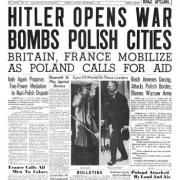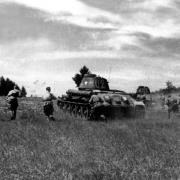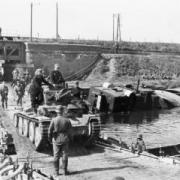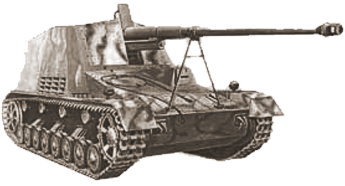The Second World War ended well over 60 million lives in six of the most horrific and brutal years in history. Today, we remember the war's beginning, exactly seventy years ago this September, mostly from the perspective of the German war machine's blitzkrieg across Poland. However, what is often forgotten is that even a tyrant such as Hitler still sought political cover for his war of expansion and extermination in Eastern Europe.
Articles


The 1941-45 war fought between Germany and Russia ranks as the bloodiest war fought in human history. Yet, in spite of this historically significant and horrific distinction, modern descriptions of the war often remain grounded in myth or distortion.
Following D-Day the Allied campaign to liberate France is often regarded as anticlimactic. What is often forgotten however, is that July of 1944 proved an anxious time for the Allied leadership. By July of 1944, enormous political pressure was mounting within the western democracies as the Allied military machine had bogged down in Normandy. Real fears regarding a return to the horrors of World War One style trench warfare swept through the Allied command.
On June 6, 1944 Anglo-American led armies successfully carried out the greatest amphibious invasion in history. Today, the Allied invasion of Nazi-occupied France is widely remembered as part of an inevitable march to victory over Hitler's armies; primarily because of the overwhelming numerical superiority the Allies enjoyed over the Wehrmacht.
By March of 1943 the North African Axis Army was doomed; trapped between two powerful Anglo-American led armies. Moreover, Italian and German forces were reliant on a logistical chain perpetually in crisis, as the Allies enjoyed overwhelming naval superiority and new air bases in Algeria and Libya to launch attacks on Axis shipping.
By April of 1945, whatever Hitler may have hoped for, the European War's end game was at hand. The Red Army's clearing operations in Silesia and Pomerania had crushed any German resistance capable of threatening a Soviet drive on Berlin, and the stage was set for the long awaited direct assault on the German capital. The overwhelming bulk of the German Wehrmacht concentrated along the Oder River, Neisse River and the Czech border. Germany left far weaker armies in the west to face the allies.
The first months of 1945 witnessed some of the European War's fiercest fighting. In spite of the fanatical defensive battle waged by the Wehrmacht, during March of 1945 the situation deteriorated rapidly for Hitler's Third Reich.

On October 9, 1939 Hitler issued Directive No. 6; a document, that among other things, advanced German plans to attack France later that same fall. Given the code name "Fall Gelb - Case Yellow" the plan Hitler's General Staff had prepared for invading France unimaginatively involved a virtual repetition of the World War One attack into Belgium; an attack to the west into Belgium in the first stage followed by a move to the southwest into France's interior in the second stage.


